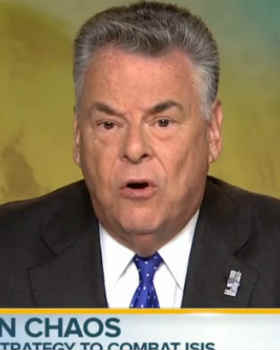Islamophobic Remarks :
Peter King is a U.S. Respresentative from a district centered in New York’s Long Island. In 2010, he became chairman of the U.S. House Homeland Security Committee. Upon assuming the chairmanship, he announced that he would hold a series of congressional hearings on the radicalization of American Muslims. At the end of 2012, King was term-limited out of the position.
In 2011 and 2012, Rep. King (R-N.Y.) held five hearings to investigate radicalization in the American Muslim community.
According to an analysis conducted by CAIR, the hearings had the ultimate effect of disproving King’s two main allegations against American Muslims.
For seven years before the first hearing, King had maintained that “80%, 85% of the mosques in this country are controlled by Islamic fundamentalists,” and that average Muslims “are loyal,” but “don’t come forward, they don’t tell the police what they know. They won’t turn in their own.” In December 2010, he staunchly announced that he will “stand-by” the 85 percent number.
Additionally in 2007, Representative King said, “Unfortunately, we have too many mosques in this country.”
After announcing the hearings, King wrote, “Federal and local law enforcement officials throughout the country told me they received little or – in most cases – no cooperation from Muslim leaders and imams.” King promised Fox News that during the hearings there will be “law enforcement familiar with the facts.”
In early 2011, Rep. King implied that American Muslims are not “American” when it comes to protecting our nation during times of war: “When a war begins, we’re all Americans. But in this case, this is not the situation. And whether it’s pressure, whether it’s cultural tradition, whatever, the fact is the Muslim community does not cooperate anywhere near to the extent that it should. The irony is that we’re living in two different worlds.”
Conclusions Regarding Rep. King’s anti-Islam Hearings
1) After four hearings [NOTE: CAIR did not analyze the fifth hearing as it was a hearing about the previous hearings], King failed to prove allegations that the American Muslim community is led by fundamentalists and does not cooperate with law enforcement. Evidence available prior to the first hearing disproved his allegation. Five of the six law enforcement officers he brought to testify, did not support these allegations.
Not a single witness attempted to factually validate the allegation that the Muslim community is run by extremists. Zuhdi Jasser, the only witness to attempt to back King up on the allegation, gave a rambling response to the charge that is exemplified by the contradictory positions he took in these sentences: “It’s a minority, but there’s an ideology that exists in some mosques — not all, not a majority — but in some mosques. And it’s a significant number.”
Below are statements of three law enforcement officials regarding relationships with the Muslim community:
- Chief Smith of Saint Paul, Minn. talked about “strong relationships” with Somali Muslims.
- Sherriff Baca of Los Angeles described “strong bonds” with the American Muslim community.
- LAPD Counter-Terrorism and Special Operations Bureau Commander Michael Downing said, “Los Angeles is known for its outreach and engagement with Muslim communities”.
Neither of the two U.S. attorneys who testified criticized Muslim leadership or mosques. Instead, former U.S. attorney Kevin Smith described a Muslim community committed to the Constitution: “In our outreach and engagement with Muslim communities, we recognize, and the Muslim communities recognize, that the law of the land is the Constitution. And that there may be sharia principles in their community that they look at, similar to Jewish laws, but the law of the land, the rule of law is the Constitution of the United States.”
Additionally, Assistant Secretary of Defense for Homeland Defense and Americas’ Security Affairs Paul Stockton said in his written testimony, “Muslim-Americans are important allies in the effort to counter violent extremism in the United States.” Speaking during the hearing, Stockton said, “And that is recognizing the tremendous contributions of Muslim Americans to national security and the armed forces in particular. We need Muslim Americans in the United States military.”
Evidence and public statements of senior law enforcement officials available prior to the hearings also contradicted King. To date, King has neither retracted his unsubstantiated allegations nor admitted that he was wrong.
King’s rhetorical smearing of an entire faith community is not based in fact. Therefore, he needs to explain how standing by the allegations serves domestic security.
2) Over the course of four hearings, King did prove what was already known: that a small number of individuals within the American Muslim community are susceptible to violent extremism.
King proved—perhaps unintentionally—what everyone already knew: a small number of individuals within the American Muslim community are susceptible to Al-Qaeda’s ideology. Given this lack of revelation, it is difficult to justify the time and expense of the hearings to tax-payers as well as the stigmatization of the American Muslim community.
American Muslims are aware that even a small fraction of violent extremists represent a threat to their nation.
Rather than joining Muslims and their representative organizations in expanding efforts to deny Al-Qaeda and its ideology, King unapologetically continues to cast suspicion on the entire community.
3) King’s record of leveling unsubstantiated allegations and biased attacks on the Muslim community and habit of calling people with records of anti-Muslim bias as potential witnesses and information sources denies him any credibility in discussions about American Muslims and homeland security.
A sober and objective examination of terrorism and the threat of violent extremism is important. King’s penchant for spicy, self-serving sound bites makes for entertaining TV, but it belittles the subject and his constituents.
CAIR asserts that Rep. King’s politically exploitative approach to the subject resulted in both broad-spectrum pushback against him and public disinterest in his hearings, after the significant attention given to the first one.
Chairman King’s general response to criticism of his hearings was that political correctness needed to be put aside for the sake of examining this threat to the homeland. CAIR agrees with putting aside political correctness in an effort to have substantive discussions. However, we also believe that King’s broad brush indictments of an entire religious minority can play no role in a serious examination of threats to our nation.
4) King’s committee is charged with helping to protect the homeland against terrorist attacks. Al-Qaeda and its allies remain the most significant terrorist threat to our nation, but other groups have carried out attacks. King’s decision to give these groups a free pass allows them a safer space to operate outside the light of his committee’s scrutiny.
Three Department of Defense witnesses agreed that threats to military communities emanate from multiple sources, not just violent extremists who claim to be acting in the name of Islam.
William Anders Folk, former Assistant United States Attorney for the District of Minnesota, said that his professional experiences taught him that threats from multiple ideologies “require the unwavering attention of law enforcement.” Police Chief Tom Smith of Saint Paul, Minnesota also agreed about the need to be concerned about domestic-based terror from groups such as white extremists. Mr. Thomas Joscelyn, senior fellow at the Foundation for Defense of Democracies, replied “certainly” when asked if Al Shabab was attempting to recruit in communities other than among Muslims.

